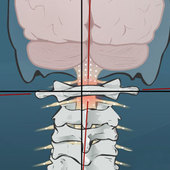If you have ever had a sink clog up, then you know that it may still be able to eventually drain its contents but at a much slower rate than usual; consequently, you will also be left with all the dirty scum on the outside to clean up.
 This becomes a very inefficient process compared to using a properly working drain. Now, imagine if your body’s waste removal systems were to become clogged—how do you think you might feel? Each organ system has its own process for eliminating toxic waste build up, including your nervous system. Your brain and spinal cord are unique in that they exist in an isolated environment from the rest of your body and thus require a specialized system for getting nutrients in and waste out. One major player in this process is the cerebral spinal fluid (CSF), a clear, water-like fluid that bathes your brain and spinal cord. CSF acts like a cushion to support these delicate organs in their protective boney casing made up of the skull and vertebrae. However, CSF not only acts as a shock absorber, but it also has a very important role in nourishing and cleaning our brain.
This becomes a very inefficient process compared to using a properly working drain. Now, imagine if your body’s waste removal systems were to become clogged—how do you think you might feel? Each organ system has its own process for eliminating toxic waste build up, including your nervous system. Your brain and spinal cord are unique in that they exist in an isolated environment from the rest of your body and thus require a specialized system for getting nutrients in and waste out. One major player in this process is the cerebral spinal fluid (CSF), a clear, water-like fluid that bathes your brain and spinal cord. CSF acts like a cushion to support these delicate organs in their protective boney casing made up of the skull and vertebrae. However, CSF not only acts as a shock absorber, but it also has a very important role in nourishing and cleaning our brain.
Our brain and spinal cord are made up of billions of cells that act like little engines; these cells require fuel to work, and they produce waste as a result of their activity. It is the CSF’s role to deliver nutrients to these cells as well as sweep in and clear out the waste build-up. When the CSF does not circulate or drain properly, there can be a build-up of cellular waste around your brain. In the short term, this sludge can lead to feelings of brain fog, decreased concentration, and headaches. Over time, if proper drainage is not restored, more chronic symptoms may begin to manifest.
So how might CSF get blocked in the first place? One of the most vulnerable areas for fluid-flow restriction is at the junction between the head and upper neck. Several factors can impede the flow of CSF in this region including genetic malformations, inflammatory or degenerative diseases affecting the neck, and biomechanical imbalances in the upper neck. Head or neck injuries resulting in misalignment of the upper neck can create additional stress on this drainage system.
You may have heard the saying, ‘a strong body starts with a strong mind’. Ensuring that you maintain good neck health is a vital way to preserve a healthy mind and maximize brain function—and it helps you avoid feeling like a clogged sink!
Written by Dr. Michelle Speranza



